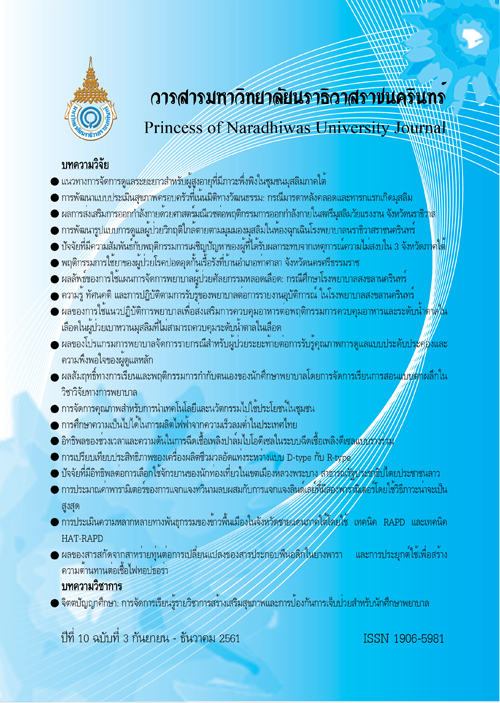Quality Management for The Implementation Process to Taking Technology and Innovation in Community Benefits
Keywords:
Quality management, Technology acceptance, Innovation, ConnunityAbstract
The purpose of this study is to identify relevant factors of quality management for the implementation
process to taking Technology and Innovation in community benefits.The methodology of this research
has been conducted under the qualitative method by purposive sampling and the in-depth interview of
9 technology and innovation developers and community leaders. Data and content analysis to synthesize
the factors. From the analysis, there are 14 factors synthesized from those analysis methods consisting of
Leadership,Communication,Teamwork,Processorientation,Customerorientation,Technologymanagement,
Strategic planning, Information and analysis, Research development, Continuous improvements, Training
management, Product quality , Outcome measurement, and Financial performance. The data from this
research can be referred as a guideline for other organizations to improve them the efficient quality
management.
References
Journal of Quality & Reliability Management, 18(6), 584-604.
Bourke, J., & Roper, S. (2017). Innovation, quality management and learning: Short-term and longer-term
effects. Research Policy, 46(8), 1505-1518.
Davis, F. D. (1989). Perceived Usefulness, Perceived Ease of Use, and User Acceptance of Information Technology.
MIS Quarterly, 13(3), 319.
Deming, W. E. (1982). Quality Productivity and Competitive Position. Cambridge : Center for Advance Engineering, Massachusetts Institute of Technology
Duran, C., Çetindere, A., & sahan, O. (2014). An Analysis on the Relationship Between Total Quality Management Practices and Knowledge Management: The Case of Eskisehir. Procedia - Social and Behavioral Sciences, 109, 65-77.
Jones, R. T., & Ryan, C. (2002). Matching process choice and uncertainty: Modeling quality management. Business Process Management Journal, 8(2), 161-168.
Kumar, V., Kim, D., & Kumar, U. (2012). Quality management in research and development. International Journal of Quality and Service Sciences, 4(2), 156-174.
Laosirihongthong, T., Teh, P., & Adebanjo, D. (2013). Revisiting quality management and performance. Industrial Management & Data Systems, 113(7), 990-1006.
Lagrosen, S. (2007). Quality management and environment: Exploring the connections. International Journal of Quality & Reliability Management, 24(4), 333-346.
Lagrosen, S., & Lagrosen, Y. (2006). A dive into the depths of quality management. European Business Review, 18(2), 84-96.
Lagrosen, Y., Bäckström, I., & Lagrosen, S. (2007). Quality management and health: A double connection. International Journal of Quality and Reliability Management, 24(1), 49-61.
Liepina, R., Lapina, I., & Mazais, J. (2014). Contemporary Issues of Quality Management: Relationship between Conformity Assessment and Quality Management. Procedia - Social and Behavioral Sciences, 110, 627-637.
Manaf, N. H. A. (2005). Quality management in Malaysian public health care. International Journal of Health Care Quality Assurance, 18(3), 204-216.
Office of the National Economics and Social Development Board. (2017). The Twelve National Economic and Social Development Plan. Bangkok: Prime Minister’s Office. (in Thai)
Pérez Pérez, M., Martínez Sánchez, A., de Luis Carnicer, P., & José Vela Jiménez, M. (2004). A technology acceptance model of innovation adoption: The case of teleworking. European Journal of Innovation Management, 7(4), 280-291.
Phonanek, P. (2015). Quality Management. Bangkok: Chulalongkorn University Printing House. (in Thai)
The American Society for Quality. (2018). The New Definition of Quality. Retrieved 7 July 2018, from http://asq.org/quality-resource/
Venkatesh, V., Thong, J. Y. L., & Xu, X. (2012). Consumer Acceptance and Use of Information Technology: Extending the Unified Theory of Acceptance and Use of Technology. MIS Quarterly, 31(1), 157-178.




